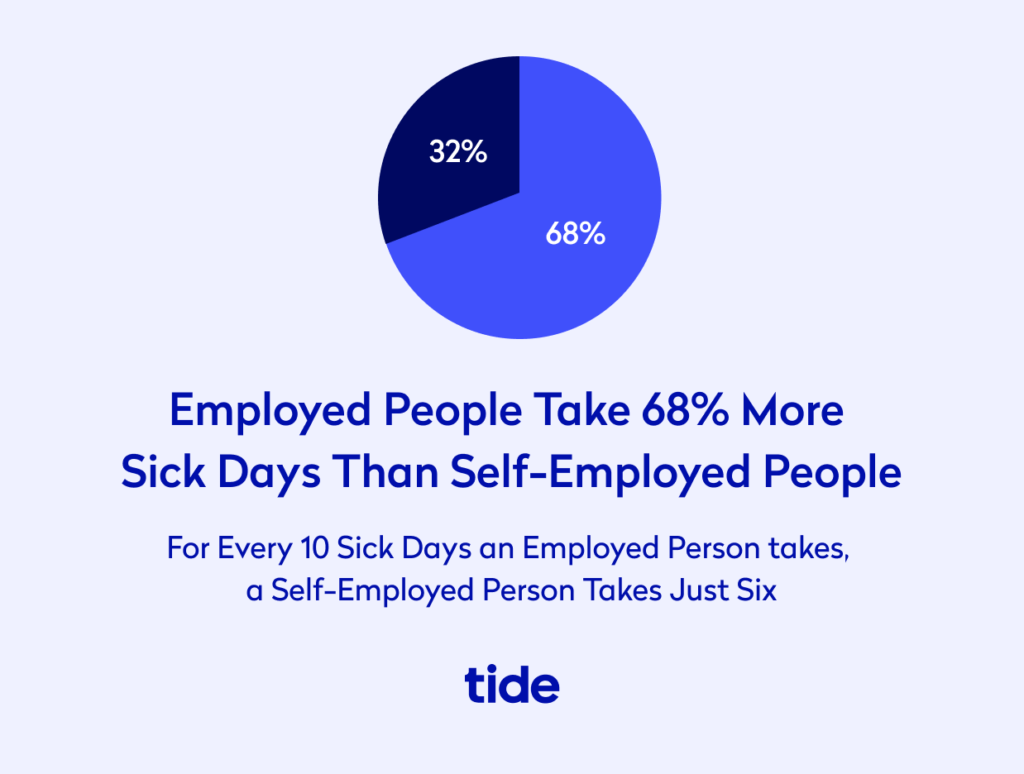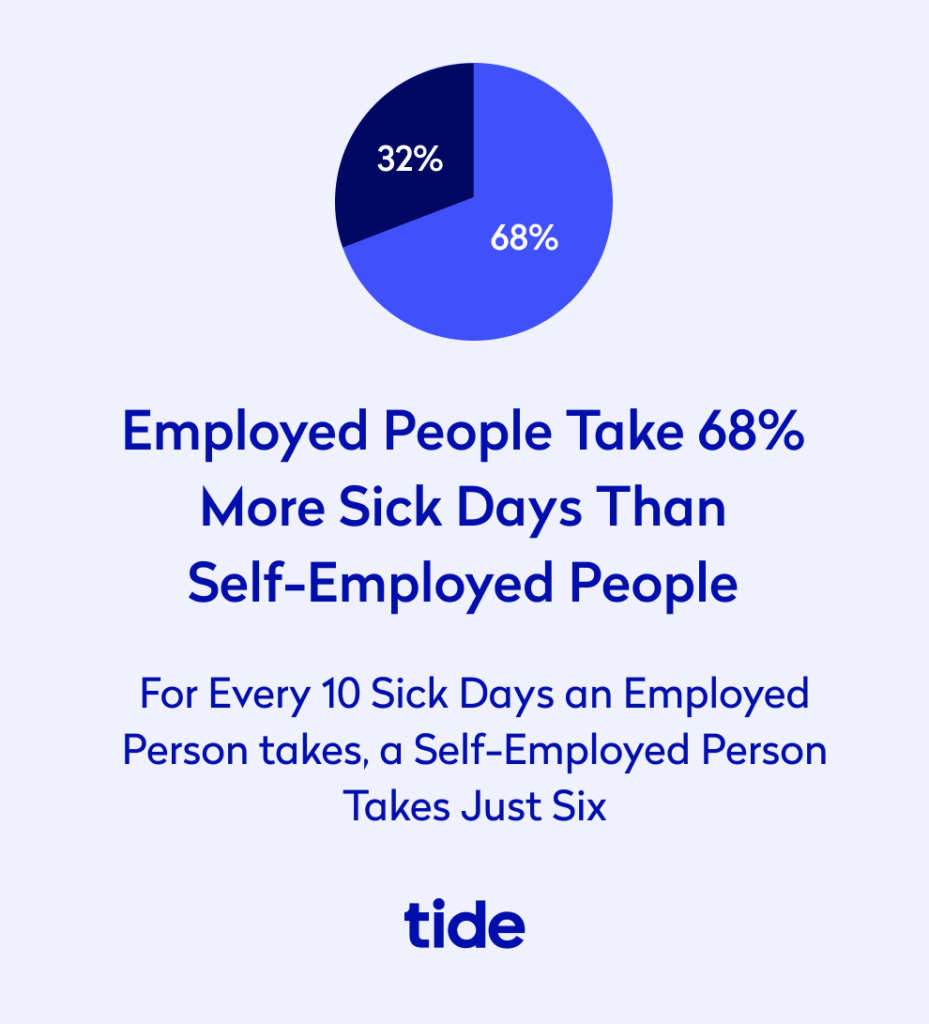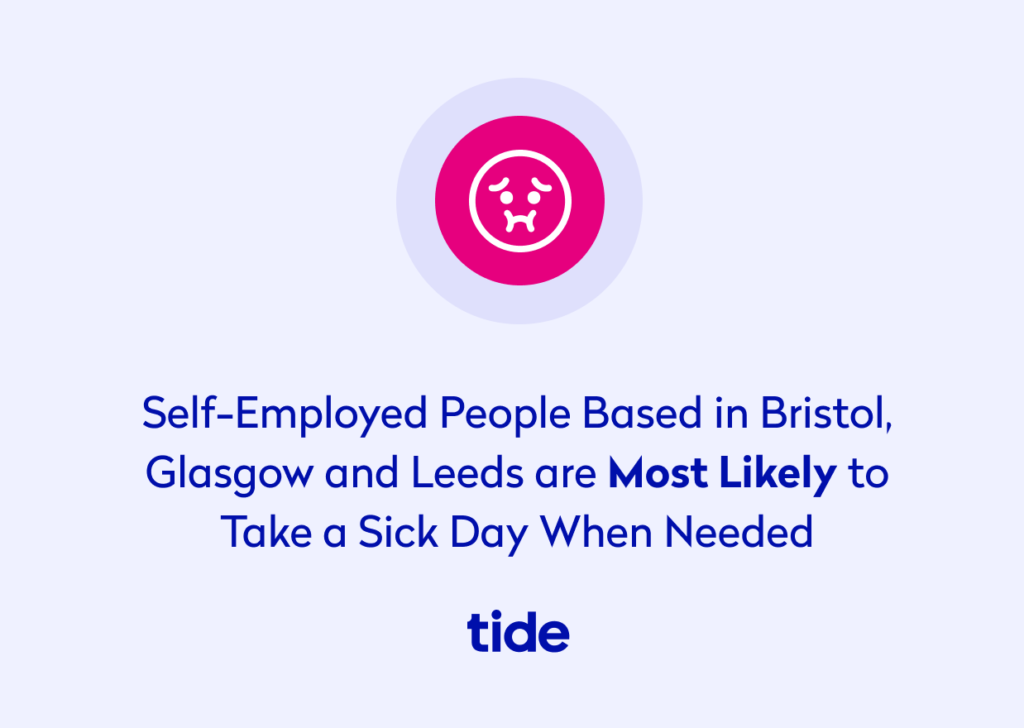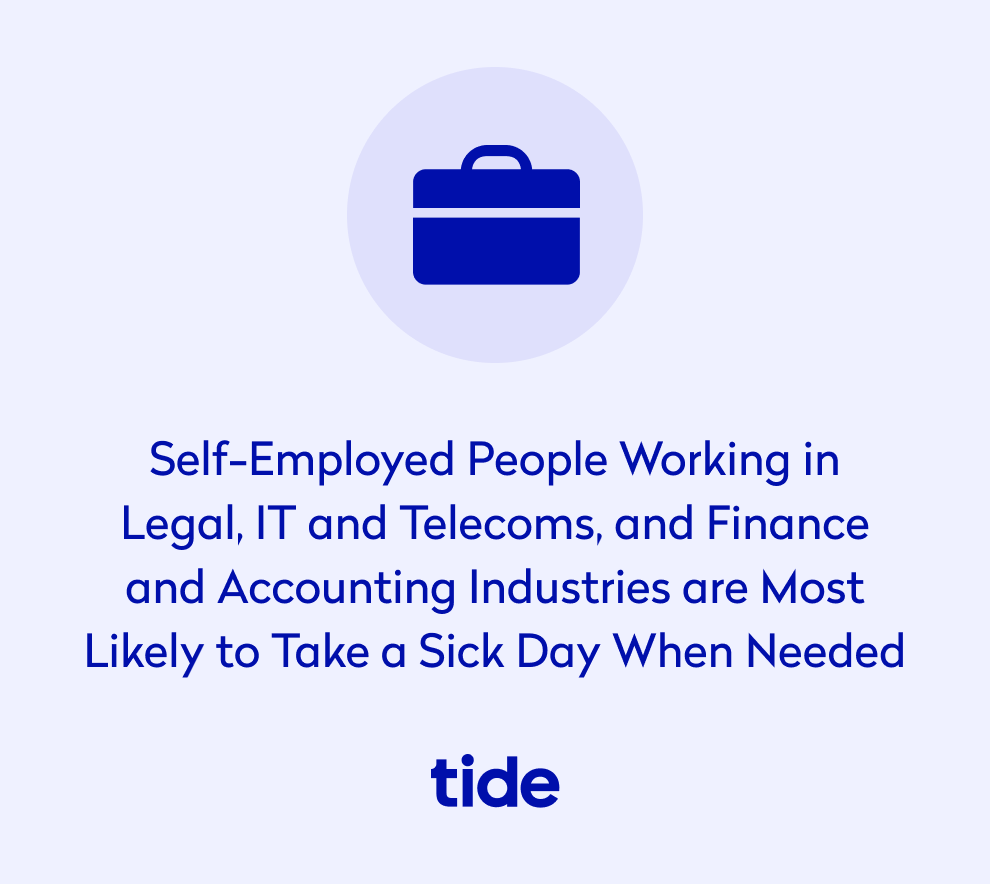
Sick day disparity: can you afford to be sick?

Do self-employed people take time off when they’re sick?
And if they do, do they get sick pay, as they would in an employed role?
These are important questions that we will answer shortly.
But first…
Sick pay for self-employed people
Sick pay is a big issue for people who contemplate self-employment.
Our recent survey around motivations and barriers to self-employment found that 27% of our respondents were deterred from going solo by concerns around how they would cover their bills if they were unable to work.
As we’ll see later, getting sick pay is less clear-cut for the self-employed. However, some provisions do exist, and there are several ways to protect your income against the unexpected. Again, we’ll explore these options later.
For now, let’s look at the data.
How does your employment status influence the number of sick days you take?
Sick days in 2019 vs 2020


On average, Britons took 5.1 sick days in 2020, compared to 4.5 sick days in 2019. While there are likely to be a range of factors causing this increase, the pandemic is the probable cause of the majority of this rise (including related issues like stress, needing to self-isolate, etc).
51% of respondents admitted that they had continued to work while unwell in the past 2 years. Why? The most common reason given was busyness – people were just too busy to pause.
Another factor that blights many modern workplaces is presenteeism: the need to be seen to show up. Working from home during the pandemic has only heightened the challenge of being seen and recognised. Many workers have reported working additional hours to ensure they were seen to be pulling their weight.
Gender differences
The pandemic seems to have had a major impact on the sick day data.
In 2019, women were more likely than men to take a sick day. Women took 4.6 sick days, compared to 4.4 for men.
In 2020, sick day numbers increased for both groups, although men increased to 5.4 days (a 23% increase over the previous year), while women only rose slightly 4.8 days.
Men were more likely to continue working while unwell (57% compared to 48% for women) – citing busyness as the reason for pushing through.
Employed vs self-employed


Employed people are more likely to take a sick day than their self-employed counterparts. While both groups have increased their sick days since the pandemic began, employed people still take 68% more sick days than self-employed people (6.2 days compared to 3.7 days).
When it comes to working while feeling unwell, the reasons for doing so vary between groups.
For self-employed people, 45% were too busy to pause, and 42% were deterred by their lack of sick pay provision. Employed people were similarly too busy (37%) but also felt guilt or pressure from colleagues to show up (22%). People in entry-level roles were most likely to work through an illness (61%).
Gender differences in self-employed respondents
Women took slightly more sick days than men in 2020 (3.7 compared to 3.5 days), which suggests that all self-employed people are either in better health or are less inclined to take time off when they’re unwell. Does self-employment make you healthier – or just more likely to work through illness? The data doesn’t tell the entire story here.
Location variations for self-employed respondents


When it came to location splits, ordered from most likely to take a sick day in 2020:
- Bristol (6.1 days)
- Glasgow (6.1 days)
- Leeds (5.2 days)
- Sheffield (4.9 days)
- Belfast (3.3 days)
- Edinburgh (4.6 days)
- Birmingham (4.0 days)
- London (3.9 days)
- Manchester (2.9 days)
- Nottingham (2.0 days)
- Cardiff (2.0 days)
- Southampton (1.6 days)
- Norwich (1.3 days)
- Liverpool / Newcastle (0.5 days)
The self-employed based in Bristol (6.1 days), Glasgow (6.1 days), Leeds (5.2 days), Sheffield (4.9 days) and Belfast (3.3 days) were most likely to take a sick day. At the other end of the spectrum, those based in Liverpool (0.5 days), Newcastle (0.5 days), Norwich (1.3 days), Southampton (1.6 days), and Cardiff (2 days) were least likely to take time off from their work.
The huge disparity in sick days between locations raises many questions. Are the variances due to different reporting practices, or is it simply the case that people in Liverpool and Newcastle are incredibly hardy – or deeply fortunate? Or perhaps some cities are better for health, or more conducive to working? Do attitudes to sickness vary around the UK – enough to influence the data? Again, these questions are not fully answered by the data.
Industry variations for self-employed respondents


Looking at industry splits, ordered from most likely to take a sick day in 2020:
- Legal (5.9 days)
- IT and telecoms (5.8 days)
- Finance and Accounting (5.7 days)
- Hospitality and Leisure (4.7 days)
- Manufacturing (4.3 days)
- Retail (3.5 days)
- Medical and Health Services (3.3 days)
- Media, marketing, advertising, PR, and Sales (3.1 days)
- Real Estate (2.9 days)
- Construction (2.5 days)
- Education (2.5 days)
- Other (1.7 days)
- Transportation and Distribution (0.9 days)
The research highlighted that self-employed working in legal (5.9 days), IT and telecoms (5.8 days), finance and accounting (5.7 days), hospitality and leisure (4.7 days), and manufacturing (4.3 days) were most likely to take a sick day.
At the other end of the spectrum, those working in transportation and distribution (0.9 days), other industries (1.7 days), education (2.5 days), construction (2.5 days), and real estate (2.9 days) were least likely to take time off from their work.
Rather like the geographical variations, there is a significant range of reporting between industries. What causes an average sick days of 5.9 for the legal industry, compared to just 2.5 days for the construction industry (an industry known for a high rate of accidents and injuries)?
Government restrictions and subsequent lockdowns impacted certain industries, which will have somewhat skewed these figures, but can part of this variation be accounted for, in part, by different attitudes to sickness? Are your law-firm colleagues more tolerant of sick days – or less accepting of presenteeism – than counterparts in construction?
Sick pay options for the self-employed
For most of us who have had regular jobs, sick days were always a simple proposition: if you felt too ill to work, you called in sick, and returned to work in a day or two once you were better. In more extreme cases, you might need to get a note from your doctor to confirm that your absence was legitimate. Most months, your paycheck would be the same, regardless of whether you took a day or two to recover from a bad cold, a sprained ankle – or an extreme hangover.
When you are self-employed, it’s not so simple. While you may be eligible for some government support (such as statutory sick pay or the employment and support allowance) you may struggle to cover your bills and expenses on £100 or less per week.
Far better to make alternative provisions that you can rely on if the unexpected happens. If you plan ahead, you may be able to make sick days easier to take – and this is how it should be. After all, you recover more slowly when you can’t take time to rest.
And most of us have felt pangs of guilt as we call a manager to request time off due to genuine sickness; when you’re self-employed, there’s nobody to ask, so you can (in theory) take the time you need to rest and recuperate.
The flip side to this is that your income probably depends on you actually working, so it can feel tricky to take time off, knowing that your income is likely to dip. This is another reason why it’s useful to make provision for unexpected illness and interruption to your business. With the right plan in place, you can rest without worrying.
Talk to self-employed people about sick pay and you will inevitably hear comments about needing fewer sick days, because the work is more enjoyable, more flexible, and more meaningful than salaried work. Many people find it easier to ‘push through’ milder illnesses when they have the freedom to work differently, or when they are driven to complete a project that they personally created and managed. This doesn’t mean that anyone should ever work when they need to rest and recover, but it’s undeniable that work feels distinctly different when you’re the boss.
Also, it could be argued that self-employment might be better for your health, particularly if you have the freedom to choose your workplace, working practices, colleagues, hours, schedule, and dress code. Could it be that self-employed people get sick less often?
Here are three alternatives to statutory sick pay to consider:
Income protection insurance
Income protection insurance is a policy you can get that will provide you with a fraction of your regular income in the event of an illness. As with any insurance policy, there are terms and conditions to meet, and these policies are usually designed to cover longer periods of illness. If you had an accident or a long period in which you couldn’t work, income protection would help you pay your bills.
Critical illness cover
Critical illness cover is a different type of insurance, designed to pay you a lump sum if you are diagnosed with a serious illness. These policies typically have a designated list of illnesses that are covered, unlike income protection insurance, which has a broader definition of illness.
Some self-employed people use both critical illness cover and income protection insurance, but many people prefer to save their financial cushion.
Savings
Income protection insurance and critical illness cover are both very effective ways to safeguard against unexpected life events, but they are relatively expensive, and will be subject to many terms, conditions and exclusions.
You may prefer to build your safety net, in the form of savings that you can rely on if you’re unable to work for a short period of time.
In Summary
For many, the benefits of becoming self-employed far outweigh the potential negatives. When you leave a salaried role, you leave behind sick pay, but you also gain the flexibility to manage your own health, wealth, and happiness.
If you decide that self-employment is right for you, remember that you can mitigate most risks – including those related to unexpected sick leave – with planning, research, and the right support team.
When you are ready – register your business with Tide for only £14.99.
Registering your business with Tide is incredibly fast, easy and only £14.99. You not only get to officially start your company, but you get a free business bank account at the same time, which is the best way to ensure you’re keeping your finances in order from day one. Be your own boss and register your company with Tide 🎉
Photo by Marcus Aurelius, published on Pexels






